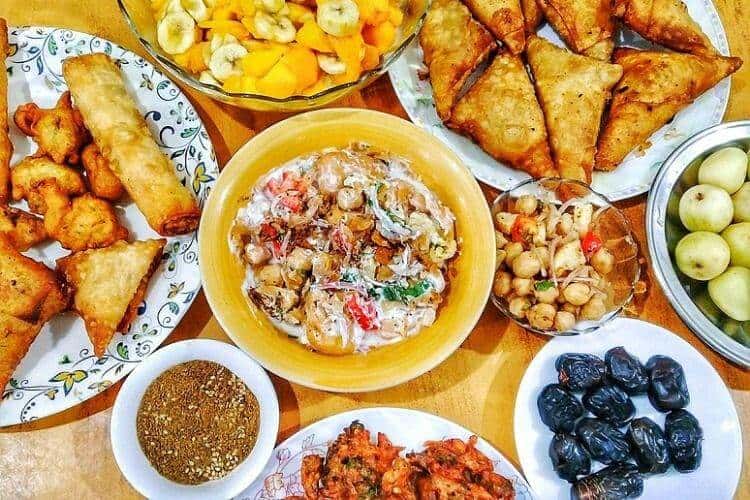LAHORE – The holy month of Ramadan is nothing short of festivity for the Muslims around the globe. This is the reason why it is taken in such a stride where food becomes a huge part of the celebration. As much as the main focus of Ramadan is on attaining the nearness of The Creator, another focal point also becomes the two main meals which everyone indulges in during the entire month; Suhoor and Iftar.
Fasting from the dawn till the sunset is a way to teach the Muslims humility, it also brings in the factor of gratefulness and allows one to be thankful for all the things they might be taking for granted. Fasting has been proven to improve mental and physical health if approached in the right manner.
A lot of times, people feel concerned that they might put on the weight because they find it hard to give up on the habitual eating that they are used to for years.
Below are some useful tips for losing weight during Ramadan:
Have a balanced Iftar: In Ramadan, the metabolism slows down therefore the energy needs of the body are automatically decreased. The Iftaar meal should not make up for all those hours of fasting which were spent without food.
While approaching Iftar, think of it as a regular dinner meal that you eat the rest of the year. After breaking the fast, don’t indulge in the food in one go, instead, take a break, offer your prayers, wait for a few minutes and then resume the meal. It will give you a perspective of how much more food you actually need and if you start feeling satisfied, you will know now is the time to stop.
Avoid fried food items: The main factor which turns out to be the reason behind all the weight gain during the month of Ramadan. For years and years, people get away with eating fried food items during their early teens and 20’s but when the age factor plays its part and the metabolism slows down, that is when the weight gain occurs. Fried food items are high in calories and low in nutrition. There are many healthier options that one should go for instead of going the typical route of Ramadan special fried food items.
They surpass the daily calorie intake recommended for an average individual’s diet and when the time comes for the actual and regular meals, they are counted as over-eating because the body has already met its daily calorie intake limit.
Don’t skip Suhoor: In Ramadan Suhoor takes the place of breakfast. Skipping Suhoor is a risky choice because you will tend to get hungrier throughout the day which will result in overeating at Iftar and that is something that has to be avoided to continue with the weight loss journey.
Don’t take too much sugar during Iftar: Another main reason for the weight gain during Ramadan happens to be the sugar that is consumed throughout the month from the beverages and sweets which are laden with sugar. The best thing to do is to avoid processed sugar because that is the last thing you need in your body if you are aiming to lose weight or not gain the extra pounds during Ramadan.
Sugar can always be substituted by consuming the food items which are rich in naturally occurring sugars such as fruits, dried fruits and honey. A good bowl of fruit salad will not only keep you fuller but will make up a hearty meal which will do good to your body and not cause any weight gain.
Limit salt intake: Sodium tends to dehydrate the body, therefore the best option is to avoid eating such food which has a considerable amount of salt in it. They will tend to make you thirsty and also impact the body’s ability to digest and absorb the fluids.
Plan a thirty minutes workout: In Ramadan, one feels overwhelmed to adjust to the new routine. A lack of proper sleeping stretch also tends to take a toll on the mind and body. Therefore it is very important to go for some sort of physical activity like brisk walking or simple exercises which will keep the body active and will prevent it from becoming too fatigued or lazy. In Ramadan, it is straightforward to feel lethargic and find excuses for not indulging in physical activity, but it becomes important, especially when weight loss is the goal.
Control your portion: Portion control is of utmost importance in Ramadan. The essence of this month is to practice patience and self-control, therefore when it comes to food, these two factors should be also kept into consideration. Not eating meals between Suhoor and Iftaar and then going overboard with the eating and indulgence is not in line with what Ramadan teaches.
Portion control is the best way to make sure that the numbers on the scale do not increase by the end of the month. Eating in smaller portions is always the right idea and also helps one understand how much the body needs.
Eat these food items during Suhoor: As mentioned earlier, Suhoor is one of the most important meals in the whole Ramadan. It should be well-balanced and designed in such a way which keeps you full and provides the body with the energy for the long hours. It is very important to pay special attention to the food that is being eaten during Suhoor. Here is the list of food items that should be taken and avoided during Suhoor.
Eat these food items during Iftar: After Suhoor, Iftar becomes another important meal of the day. As much as Iftar is the most awaited meal to break the fast, it should be prepared carefully keeping the calories and portions in the mind. It should have a variety of food categories such as protein, fruits and vegetables to meet the needs of your body.
Have a blessed and healthy Ramadan!














